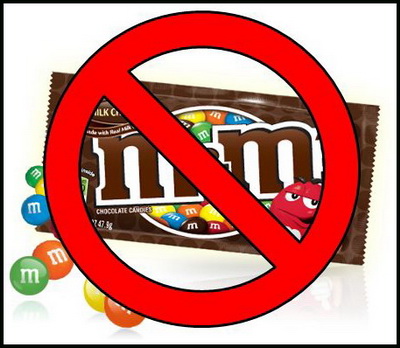M&M’s may be loved the world over, but if Swedish people want them, they may need a new name. This news comes after the Swedish Court of Appeals ruled that the M&M’s mark causes confusion among Swedish consumers due to a traditional Swedish chocolate candy that also comes marked with the letter “M”. Mars, the manufacturer of M&M’s, will now need to change the name of the candies in Sweden, appeal the decision, or face penalties laid out by the Court of Appeals if it continues selling there.
Mondelez International markets the traditional Swedish Marabou candies which have been marked with a lowercase “M” since the 1960s. Mondelez claims that although Mars helped Marabou launch its M line of candies in the 1950s, M&M’s entry into Sweden now constitutes trademark infringement. Part of the Marabou launch included an agreement between Mars and Mondelez that said that Mars would not sell M&M’s in Sweden. That agreement expired in 1998 and was not extended. Mars then introduced M&M’s in Sweden in 2009, leading to this current dispute.
It may seem that with M&M’s worldwide popularity and presence, that there may not be any real likelihood of consumer confusion with Marabou candies, but international trademark rules vary from country to country. Just because a brand is famous in one or even many countries, does not mean that it automatically qualifies for trademark protection in another country. While customers in the United States may have a good understanding of the bounds of the M&M’s brand, Scandinavian customers may mistakenly believe there is some association between Marabou and M&M’s.
In today’s global economy, brands are more likely to cross borders and find marketability internationally. The Madrid Protocol is an international treaty that may help streamline the trademark application process in multiple countries. This protocol allows the filing of one application that is examined in multiple countries. While this eases the burden of filing in each country, it does not grant any type of unified, international trademark. Each country in which the application is approved will grant its own trademark registration.
For Mars and M&M’s, this doesn’t help because Marabou was using the “M” mark in Sweden long before M&M’s came to the Nordic country. Unless Mondelez Mars can work something out with Mondelez and Mondelez allows Mars to use the M&M’s mark in Sweden, Mars will need to choose one of the options mentioned above – appeal or change the name. With the extensive goodwill and brand equity behind M&M’s, a name change doesn’t seem too enticing. But it may end up being the only way Mars’ can sell the candies in Sweden.
Even the biggest brand names can run into issues in our global economy. If you have questions about the trademark process and what to do to protect your brand in future markets, please contact the trademark attorneys at Trademark Access. Let our experience protect your valuable brand.

